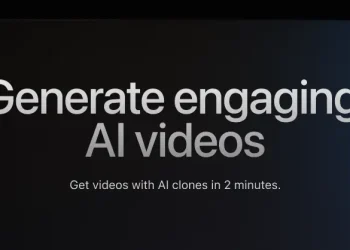Did you know that only 29% of organizations “mostly” or “always” finish their projects on time? This fact comes from a survey by Wellingtone. It shows we really need new ways to manage projects. AI in project management is changing the game. It helps companies do tasks faster, automate boring work, and make better decisions. This leads to a big increase in productivity and success of projects.
There are over 50 templates on platforms like Jasper to help with meeting plans and updates. This shows how AI can change how teams work. As 64% of businesses think AI will make them more productive, learning to use AI in project management is key. AI makes admin tasks easier and helps development teams work better together.
Key Takeaways
- Only 29% of organizations complete projects on time, pointing to a need for improvement.
- AI integration in project management is increasing, with 37% of projects managed using AI.
- 64% of businesses anticipate that AI will enhance productivity outcomes.
- AI-powered tools can automate tasks and provide real-time insights for better decision-making.
- Challenges in AI adoption include resistance from teams and data quality issues.
- Agile project management is increasingly recognized for its emphasis on flexibility and adaptability.
Understanding AI for Project Management
Learning about AI in project management is key for those wanting to use it well. Understanding artificial intelligence means using algorithms and machine learning to look at lots of data. This can really help improve how projects are managed. A big 72% of software teams are checking out AI tools, showing they’re interested in adding these techs to their work.
AI helps a lot with planning, figuring out how long things will take, setting priorities, and making the to-do list better. Using AI in these areas makes teams work smoother, cuts down on repetitive tasks, and makes work more accurate. This is what developers really want.
By doing tasks like entering data and setting up schedules automatically, teams can spend more time on important work. This makes them work better and faster.
AI’s predictive analytics are key in guessing how projects will go and spotting problems early. This helps teams make smart choices ahead of time. It keeps projects on track and helps managers use resources well. Using past data, AI can make creating tasks and making decisions better, leading to better project results.
But, AI isn’t perfect and has its challenges, like bad data and fitting in with other systems, which 63% of companies say is hard. There are also worries about security and bias. Yet, combining AI with human skills aims to make things better together, not replace them. This mix of tech and expertise helps make projects run smoother.
Importance of AI in Project Management
AI is becoming more important in project management. Companies want to work smarter and faster, so they use AI tools. This move matches the current focus on making things automated and based on data.
Current Trends in AI Utilization
Project managers are keeping up with the changes and adjusting. They’re using AI to plan projects better, like scheduling and figuring out who does what. This helps them save time and focus on big decisions.
AI is changing how we manage tasks too. It helps assign tasks, keeps track of progress, and suggests what to do first. By matching tasks with the right people, AI makes managing tasks better.
Potential Growth Predictions by 2023
By 2023, about 75% of companies plan to use AI in managing projects. AI will be key by offering tools that predict what might happen. This helps managers make smart choices by looking at past data.
AI will also make it easier to keep an eye on projects in real-time. Leaders will get updates fast on how things are going and any problems. Automated reports will become common, making things simpler and saving time.
Adding AI to project management is a big change. It will make things more efficient, use resources better, and help with making decisions.
| AI Function | Benefit |
|---|---|
| Automated Task Management | Saves time and improves task tracking. |
| Predictive Analytics | Identifies risks and optimizes project outcomes. |
| Real-time Monitoring | Provides up-to-date information on project progress. |
| Resource Allocation | Optimizes resource distribution based on skills and availability. |
| Automated Reporting | Simplifies reporting processes with real-time data. |
Benefits of AI in Project Management
Using AI in project management brings many advantages. These include better efficiency, smarter decision-making, and better data analysis. AI automates simple tasks, letting teams focus on big-picture strategies. This gives a big advantage in today’s fast business world.
Increased Efficiency and Productivity
AI tools take care of tasks like setting up meetings, making reports, and sending reminders. This lets staff focus on important tasks. Teams can manage more projects without losing quality. Companies using AI in project management see lower costs and finish projects on time.
Improved Decision-Making Processes
AI helps managers keep track of project progress and spot potential problems. It looks at lots of data to help make better decisions. This means managers can act fast on risks and chances, leading to better project results.
Enhanced Data Analysis and Forecasting Capabilities
AI is great at looking at past data to find trends and optimize how resources are used. It suggests the best way to use people and resources, which is great for teams with many projects. This leads to better planning and a focus on improving through data insights. For more on AI in creative projects, check out enhanced artistic visions.
Integrating Machine Learning in Project Management
The integration of technology through machine learning has changed the game for project teams. They can now use historical data and AI to predict project timelines, costs, and resources needed. This helps them stay on track and keep projects within budget and schedule.
AI and machine learning automate tasks like tracking progress and making reports. This lets teams focus on important strategic tasks. As a result, operations get smoother, making things more efficient and improving quality.
Machine learning looks for patterns in big datasets with predictive analytics. It spots risks early, helping managers fix them before they get worse. This is useful in many areas, from building projects to IT development, showing how AI helps in different fields.
AI tools also improve team communication by giving real-time updates and insights. This leads to better decision-making, cutting down on guesswork. Project managers say that using machine learning boosts performance and changes how they manage projects.
Looking ahead, 81% of project pros see AI technologies making a big impact. They expect machine learning to be key in handling project challenges.
| Benefits of Machine Learning in Project Management | Description |
|---|---|
| Predictive Analytics | Forecast project timelines and costs with high accuracy using historical data. |
| Automation | Reduce time spent on routine tasks, allowing teams to focus on strategy and leadership. |
| Resource Optimization | Analyze project needs and team capabilities for efficient resource allocation. |
| Risk Management | Identify potential risks early and implement mitigation strategies. |
| Enhanced Collaboration | Facilitate real-time communication and updates among team members. |
AI Tools for Project Management
AI tools for project management boost productivity and improve team communication. They automate tasks, analyze data, and make projects more efficient. Many software options are available, each with unique features for different project needs.
Popular AI Project Management Software
Some top AI project management tools include:
- Asana: Started in 2008, Asana has a free version and premium plans starting at $10.99 per user monthly. It scores a 4.3 on G2.
- ClickUp: Affordable at $5 per user monthly, ClickUp offers customization and AI for creative tasks. It has a 4.7 rating on G2.
- Monday.com: A versatile AI tool for managing projects. It doesn’t have specific stats but is a big help in project management.
- Fireflies.ai: This tool aims to make meetings more productive and scores a 4.5 on G2.
- Timely: Great for tracking time, Timely gets a 4.8 rating on G2.
- Taskade: A workspace for collaboration with a 4.6 rating on G2.
- Fellow: Designed to make meetings better, Fellow is rated 4.7 on G2.
- Clockwise: Specializing in smart calendar management, Clockwise scores a 4.8 on G2.
Features to Look for in AI Tools
When picking AI tools for project management, look for these key features:
- Automation capabilities: Automation can save over two hours per day, making tasks easier.
- Analytics functions: Good analytics give teams the data they need to make smart choices.
- User-friendly interface: Easy-to-use designs help teams adopt and use the tools better.
- Integration capabilities: Working well with other systems makes operations smoother.
Using these popular software choices brings important tools to project management. They help teams meet their goals more efficiently.
| Software | Pricing | G2 User Rating |
|---|---|---|
| Asana | Free / $10.99 per user/month | 4.3 |
| ClickUp | $5 per user/month | 4.7 |
| Monday.com | N/A | N/A |
| Fireflies.ai | N/A | 4.5 |
| Timely | N/A | 4.8 |
| Taskade | N/A | 4.6 |
| Fellow | N/A | 4.7 |
| Clockwise | N/A | 4.8 |
Real-World Applications of AI Project Management Solutions
AI project management tools are now used in many industries. They help make things run smoother. Companies use these tools to improve how they talk to each other, make decisions, and manage resources.
For example, Accenture uses a predictive model that guesses if a sales opportunity will work out with 97% accuracy in just three seconds. This helps teams make quick, smart choices. Unilever uses AI to check video interviews of job candidates, saving about 100,000 hours of work.
The healthcare field is seeing big changes thanks to AI. VieCuri Medical Center uses AI to manage staff better, helping deliver healthcare well across many places. In finance, PwC works with TruEra to look at the risks of using AI in projects.
TUI uses AI to plan tours, making it faster and more engaging for customers. Fingent uses AI to get project costs right, cutting out mistakes in software development. Akkio’s AI helps companies plan their budgets, helping them make smart choices about spending.
These examples show how AI is changing project management for the better. It makes things run smoother, helps use resources better, and boosts performance overall.
| Company | Application | Impact |
|---|---|---|
| Accenture | Predictive analysis for sales | 97% accuracy in opportunity success |
| Unilever | AI in recruitment | Saved 100,000 hours of time |
| VieCuri Medical Center | Resource management | Optimized staffing across multiple locations |
| PwC | Risk assessment | Evaluating AI adoption risks |
| TUI | Tour planning | Enhanced customer interaction |
| Fingent | Cost estimation | Reduced human error in software development |
| Akkio | Cost modeling | Nuanced estimations for strategic decisions |
Challenges of Implementing AI in Project Management
Implementing AI in project management comes with many challenges. Project managers must tackle these issues to make AI work well. This is key to getting the most out of AI for better project results.
Data Quality and Integration Issues
Data quality is a big problem with AI. Bad data and broken data systems cause data integration issues. For AI to work right, it needs good, dependable data for making decisions.
Companies often struggle with managing their data. It’s important to check your data, build a strong data system, and maybe get data from outside if you don’t have enough. Being proactive helps avoid problems with bad data.
Team Resistance to AI Adoption
Getting teams to accept AI can be hard. Some might worry that AI will take their jobs or make them lose control. Talking openly about AI’s benefits and training teams can help ease these worries.
Creating a team that welcomes technology helps with the change to AI in project management. This keeps team spirit high during the move to AI.
| Challenge | Implication | Solution |
|---|---|---|
| Data Quality Issues | Inaccurate decision-making due to unreliable datasets | Implement rigorous data management practices |
| Integration Issues | Inefficiencies stemming from fragmented data systems | Develop a centralized data infrastructure |
| Team Resistance | Reduced engagement and morale among team members | Provide clear communication and extensive training |
| Cost Management | High initial costs for software and training | Consider off-the-shelf solutions for budgeting |
| Skill Gaps | Need for specialized knowledge in data science | Invest in training and professional development |
Future of AI in Project Management
The future of AI in project management looks bright as companies aim to use its huge potential. With AI advancements, automation tools are set to change how we manage projects. They will make old methods more flexible and quick to adapt.
Gartner predicts that by 2030, 80 percent of project management work will be done with AI. This change shows a big move towards evolving project management tools with more power. For instance, AI tools like Microsoft’s Copilot can quickly summarize meeting notes and use important data. This saves time for project managers, letting them focus on important tasks like working with stakeholders and guiding their teams.
AI technologies are becoming key for project managers in many areas, like planning, spotting risks, and reporting metrics. AI insights show these tools can cut the daily workload by 2-5%. This means managers can spend more time on big-picture tasks. Also, machine learning’s predictive abilities give managers insights from past data, improving their decisions and leading to better project results.
While the idea of fully autonomous project management is still in the works, AI is already changing how we do everyday tasks. The gains in efficiency from automation will make the competition tougher, possibly leading to fewer project management jobs as workflows get more efficient.
| AI Tools | Applications | Benefits |
|---|---|---|
| Microsoft Copilot | Meeting summaries, data repurposing | Time-saving, increased focus on high-value tasks |
| ChatGPT | Writing personas, generating documentation | Efficient content creation, reduced manual effort |
| Predictive Analytics Software | Risk identification, performance tracking | Enhanced forecasting, informed decision-making |
Embracing the future of AI in project management can lead to more efficiency and success. It’s an exciting change that companies shouldn’t miss out on.
Project Management Software AI Integration
AI has changed how we manage projects. Now, project management software includes AI to make tasks easier and give us insights. This change helps teams work better together and do their jobs more effectively.
Software like HiveMind uses AI to help with Notes, Action Cards, and Emails. It also has AI for scheduling and automating workflows. This makes teams more productive and accurate. The main benefits of using AI in project management software are:
- Real-time data analytics and insights
- Cost savings by minimizing manual errors
- Risk reduction through trend monitoring
- Enhanced decision-making capabilities
Tools like ClickUp, Notion, Taskade, Basecamp, and Asana use AI to improve projects. For instance, ClickUp has a free plan and uses AI for creating content. Notion gives unlimited AI tools for Q&A and autofill. These tools help teams quickly solve problems and meet project goals within time, cost, and quality limits.

Strategies for Successful AI Implementation
Using AI in project management needs the right strategies to boost efficiency and team work. It’s key to make sure the team knows how to use AI well. This helps overcome the hurdles of adding AI to projects.
Training and Support for Teams
It’s crucial to teach the team about AI tools. Training should cover many topics, like:
- Understanding AI applications, such as predictive maintenance and customer service automation.
- Instilling data quality awareness to tackle issues with data storage and format.
- Promoting familiarization with agile methods, which help manage AI projects well.
Support is key to helping teams master AI for project wins. AI strategies should focus on:
- Creating a culture of continuous learning, so teams can keep up with AI updates.
- Engagement with stakeholders to build support for AI projects.
- Establishing feedback loops to improve processes and boost performance over time.
The Role of Predictive Analytics in Project Management
Predictive analytics changes how we manage projects by using past data to guess future outcomes. This method, powered by AI, helps managers see challenges ahead and plan better. They can decide where to use resources and when to schedule tasks.
AI looks at project data as it happens, which means it keeps getting smarter. This helps teams find the best team setups for new projects by looking at what worked before. Predictive analytics is key in keeping an eye on important project details like staying on budget, meeting deadlines, and how well the team works.
Data visualization tools make complex info easy to understand, helping everyone talk better. This makes teams work together better, even when they’re not in the same place. AI’s automation lets managers focus more on big-picture planning and talking to stakeholders, not just day-to-day tasks.
Using predictive analytics, teams can spot and fix problems early. This focus on data-driven decisions makes projects run smoother and more efficiently. It helps set the stage for projects to succeed.
| Aspect | Predictive Analytics Impact |
|---|---|
| Resource Allocation | Optimizes use based on past data patterns |
| Risk Management | Identifies risks early for proactivity |
| Team Composition | Improves future team selections with analyzed data |
| Project Tracking | Monitors KPIs effectively for better decision making |
| Time Management | Reduces delays through predictive insights |
Predictive analytics boosts decision-making and makes projects run smoother. As companies move to use data more, predictive analytics in project management is key to success.
Ethics and AI in Project Management
Using artificial intelligence (AI) in project management raises big ethical questions, especially about privacy and bias. As more companies use AI, project managers must focus on ethics to deal with these issues. It’s key to have clear ethical rules to build trust and ensure fair treatment in projects.
Addressing Privacy and Bias Concerns
Privacy and bias are major challenges in using AI ethically. Companies need strong rules to keep personal info safe. If they don’t, it can hurt both people and the company.
AI bias comes from the data it’s trained on. If the data doesn’t show a wide range of people, the AI can be unfair. To fix this, checking the data for diversity is crucial. Also, having outside experts check the AI regularly helps keep it honest.
Now, project managers might focus on ethics with special roles for Ethical AI. Groups for project management should push for more ethical AI use. This means making AI better for workers, not just replacing them, and keeping a focus on people.
The following table outlines key ethical considerations for AI in project management:
| Ethical Consideration | Description |
|---|---|
| Fairness and Bias | Preventing discrimination related to race, gender, and socioeconomic status. |
| Transparency | Providing clear explanations of how AI functions and how user data is used. |
| Privacy | Safeguarding user data against unauthorized access and misuse. |
| Safety | Avoiding accidents or harms caused by AI systems. |
| Explainability | Making sure users understand decision-making processes in AI systems. |
| Human Oversight | Ensuring human involvement in the monitoring of AI systems and their alignment with values. |
| Trustworthiness | Building user trust through accountability and transparency. |
| Human-Centered Design | Prioritizing user experience in AI design. |
| Responsibility | Taking ownership of the outcomes produced by AI systems. |
| Long-Term Impact Analysis | Considering societal and environmental effects of AI deployment. |
By thinking about these ethical issues in project management, companies can use AI safely and ethically. This way, they avoid risks and make projects better and more responsible with AI.

Conclusion
AI is changing how we manage projects. With $48 trillion spent on projects each year and only 35% finishing well, we need better ways to work. AI tools help managers make better choices and improve how projects run.
Recent AI updates, like ChatGPT in November 2022, are making a big difference. Tools like ASANA, TRELLO, and Microsoft Project show how automation and teamwork can lead to success. The McKinsey Global Institute says companies using AI are getting ahead, making it key for leaders to focus on efficiency.
AI does more than just automate tasks. It uses data to predict project success and understand complex information. By combining human skills with AI, we can create new jobs and change how projects are managed. This will lead to a more efficient future.
FAQ
What are the benefits of AI in project management?
AI in project management boosts efficiency and productivity by automating routine tasks. It also improves decision-making with real-time data insights. Plus, it enhances data analysis and forecasting for better resource use and planning.
How does machine learning impact project management?
Machine learning helps project teams analyze big datasets better. This means they can predict timelines, costs, and resource needs more accurately. Project managers can then make smart changes to stay on track and within budget.
What are popular AI tools for project management?
Popular AI tools for managing projects include Trello, Asana, ClickUp, and Monday.com. These tools use AI to make project processes smoother and improve team work together.
What challenges might arise when implementing AI in project management?
Challenges with AI include data quality and integration problems from inconsistent data or separate systems. Also, some team members might resist AI, so it’s key to explain its benefits and offer training.
How will the role of AI in project management evolve in the future?
AI in project management is set to grow, with more use of automation and predictive analytics. This will lead to more efficient and adaptable project management systems, changing how we manage projects.
What strategies are effective for successful AI implementation in project management?
For AI success, offer thorough training and support to team members. This helps them understand AI tools and use them well, creating a culture of learning and growth.
How do predictive analytics support project management processes?
Predictive analytics use past data to help make smart decisions on resources, timelines, and risks. This approach lets teams tackle challenges early, leading to better project results.
What ethical considerations should be taken into account when using AI in project management?
Using AI, focus on ethical issues like data privacy and algorithm fairness. Set clear rules to ensure AI is used fairly and builds trust among stakeholders.




